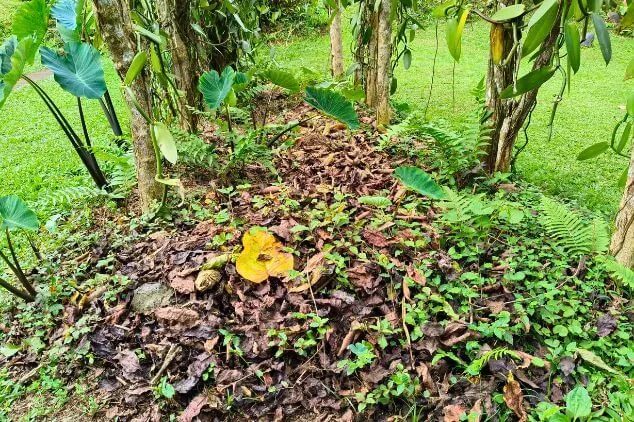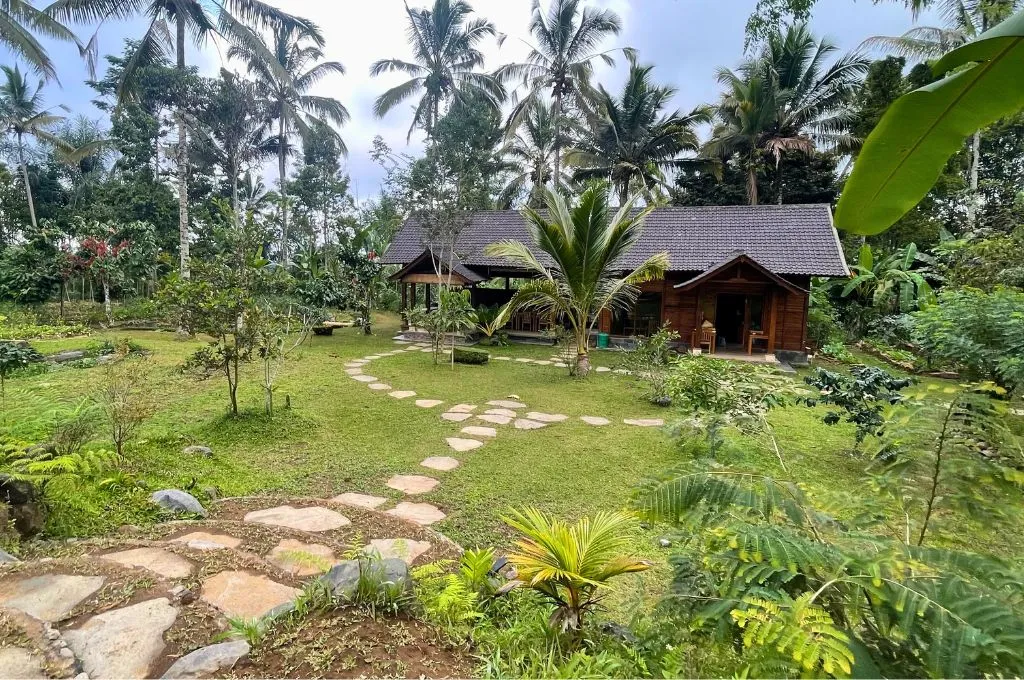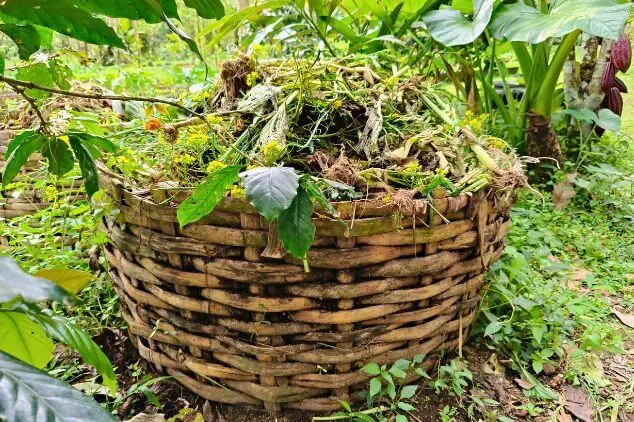How We Nurture Our Soil & Bali Through Composting & Responsible Waste Management
At Taman Dukuh, our commitment to a true farm-to-table experience doesn’t end when the delicious Balinese meal is enjoyed. We believe in “closing the loop,” ensuring that we give back to the earth as much as it gives to us.
A vital part of this is our dedicated approach to composting and responsible waste management – practices that keep our organic farm thriving and Bali beautiful.
It might happen “behind the scenes,” but we’re incredibly passionate about it! Understanding how we manage waste and create “black gold” through composting adds another layer to the “authentic” and sustainable Bali experience our guests appreciate. It’s all part of our promise to nurture nature.
The Importance of Mindful Waste Management in Bali
Bali is an island of incredible natural beauty, a “tropical heaven” as many of our guests describe it. However, like many popular and beloved destinations worldwide, it faces significant environmental challenges, including waste management.
We firmly believe that every individual and business, no matter how small, has a vital role to play in protecting this precious island paradise.
For us at Taman Dukuh, responsible waste management isn’t just an operational necessity; it’s a moral obligation and a core part of our identity.
This commitment is deeply connected to timeless Balinese philosophies that guide our overall sustainability practices:
- Tri Hita Karana:
This fundamental Balinese philosophy emphasizes harmony with nature (Palemahan), harmony among people (Pawongan), and harmony with God (Parahyangan). Managing our waste responsibly is a direct expression of our respect forPalemahan. - Nyegara Gunung (Mountain-Sea Harmony):
This concept teaches the interconnectedness of all ecosystems, from the mountains to the sea. Preventing pollution through proper waste management on our land helps protect the health of Bali’s vital waterways and ultimately, its oceans.
By thoughtfully managing our waste, we aim to:
- Significantly reduce our contribution to Bali’s landfill burden.
- Prevent pollution of Bali’s beautiful landscapes, precious soil, and vital waterways.
- Conserve natural resources by actively reusing and recycling materials.
- Create invaluable, nutrient-rich soil amendments through our comprehensive composting program, nourishing our organic farm naturally.
Our Composting System: Turning Kitchen & Farm “Waste” into “Black Gold” for Our Soil
Composting is truly at the heart of our organic waste management strategy and a key secret to the success and fertility of our thriving organic farm!
It’s a beautiful, natural process that transforms organic materials – things that might otherwise be considered “waste” – into a dark, crumbly, nutrient-rich soil conditioner that we lovingly call “black gold.” This is a cornerstone of our seed-to-plate journey.

What We Lovingly Compost at Taman Dukuh:
We have a “well-oiled machine” when it comes to collecting and processing our organic matter:
- Kitchen Scraps from our Cooking Classes & Preparations:
Think vibrant vegetable peelings, fruit cores and skins, coffee grounds, tea leaves, and other plant-based leftovers from the “delicious” Balinese dishes our guests learn to prepare. - Organic Farm & Garden Trimmings:
Grass clippings, leaves, small twigs, withered plants, and other green waste generated from maintaining our “gorgeous” farm and gardens. - Remains from Daily Balinese Offerings (Canang Sari):
The natural components from daily Balinese offerings, such as flowers, banana leaves, and small rice portions, once their spiritual purpose is fulfilled, are respectfully added to our compost, returning their organic matter to the earth.
How Our Composting Works & Its “Amazing” Benefits:
We use a combination of composting methods suitable for our tropical environment, including layered pile composting. Millions of beneficial microorganisms (bacteria, fungi, actinomycetes) work their magic, diligently breaking down the organic matter over several weeks or months.
This natural transformation process:
- Enriches Our Soil Beyond Measure:
The finished compost is absolutely packed with essential plant nutrients, beneficial microbes, and vital organic matter. This dramatically improves soil structure, fertility, aeration, and water retention on our farm, creating the perfect environment for healthy plant growth. - Eliminates the Need for Chemical Fertilizers:
Healthy, vibrant soil fed with our homemade compost means healthier, more resilient plants that are naturally resistant to pests and diseases. This completely eliminates the need for synthetic fertilizers, which is crucial for maintaining our organic status and ensuring the purity of the Balinese ingredients we grow and use in our Ubud cooking school. - Significantly Diverts Waste from Landfills:
A very large portion of what might otherwise be considered waste is instead transformed into a valuable resource right here on our property. This substantially reduces our contribution to Bali’s landfill challenges and promotes a circular economy on our farm. - Completes the Seed-to-Plate (and Back-to-Seed!) Journey:
It’s the ultimate, most beautiful recycling program, where the “waste” from one cycle – the preparation and enjoyment of food – directly feeds and nourishes the beginning of the next cycle of growth. It’s a living example of nature’s perfect design.

Beyond Composting: Our Wider Waste Reduction Efforts – Every Little Bit Helps!
While composting our organic matter is a major focus, our commitment to responsible waste management at Taman Dukuh extends much further.
We believe in the “Reduce, Reuse, Recycle” hierarchy and apply it thoughtfully across our operations:
- Reduce at the Source:
The best way to manage waste is to not create it in the first place! We prioritize reducing waste by being mindful of our purchases, choosing products with minimal and eco-friendly packaging, buying in bulk where practical to reduce packaging waste, and designing our cooking class menus to utilize ingredients efficiently. - Reuse Creatively:
Before recycling or disposing of anything, we always ask: “Can this be reused?” Many items find new life on our farm or in our operations – glass jars for storage, old textiles for cleaning rags, or even creative upcycling projects. - Recycle Diligently:
We diligently sort our non-organic waste, carefully separating recyclables such as plastic bottles (though we strive to minimize these), glass, paper, and cardboard. We then work with local collection services or community recycling initiatives (bank sampah) to ensure these materials are sent for proper recycling and don’t end up in landfills or polluting the environment. - Minimizing Single-Use Plastics:
We are actively working to significantly minimize single-use plastics throughout Taman Dukuh. This includes things like providing filtered drinking water for our guests and team to refill their own reusable bottles, seeking alternatives for plastic packaging from our suppliers, and using natural materials like banana leaves for food wrapping whenever possible, as part of our broader sustainability efforts. - Thoughtful Local Sourcing for Less Waste:
Our practice of sourcing ingredients locally often involves less packaging and shorter transportation distances compared to ingredients brought in from far away, further reducing our overall waste footprint. - Educating Our Team & Guests:
We believe in raising awareness and sharing our journey. Our “friendly and passionate” team is trained in our waste management protocols, and we gently encourage our guests, during farm tours and cooking classes, to be mindful of their environmental impact and perhaps take some of these ideas home with them.
Your Visit Supports a Greener Bali!
When you choose to experience Taman Dukuh, you’re doing more than just joining a “fantastic” Balinese cooking class; you’re directly supporting our heartfelt efforts to operate sustainably and responsibly.
Learning about our composting systems and waste management practices is often an “insightful” and inspiring part of the farm tour for our guests. It helps paint a complete picture of our holistic seed-to-plate (and back to seed!) philosophy.
We deeply believe that these practices, though often happening quietly behind the scenes, are absolutely essential to preserving the “gorgeous setting” and delicate ecosystem of Bali.
They ensure that we can continue to share its “amazing” culinary traditions and natural beauty in a way that honors and protects the environment for future generations. It’s about creating “unforgettable experiences” that are also kind and respectful to our precious island home.
Or join one of our hands-on cooking classes!

